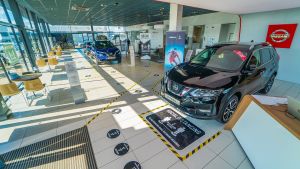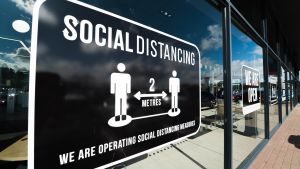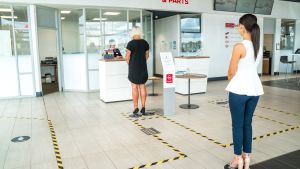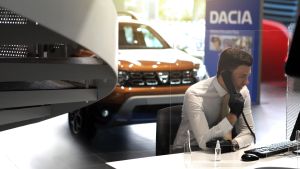A
Auto Express
Guest
When coronavirus reached the shores of Great Britain, eventually forcing the country into lockdown, it was bad news for the automotive industry – which meant bad news for the UK economy.
The UK car industry is worth more than £82billion in turnover, and adds £18.6billion of value to the country’s economy as a whole.
Dealerships are a hugely important part of this – some 2.3 million new cars were registered in the UK in 2019. But in 2020 so far, the year-to-date figure is already down by almost 50 per cent.
Certain manufacturers and dealer groups were better prepared for lockdown than others, with online sales systems giving some brands a big advantage over their rivals at the time.
However, on 1 June, car dealerships were allowed to reopen in England, and the rest of the UK wasn’t far behind. To find out what the buying experience will be like for customers venturing back into dealerships – or making enquiries from the comfort of their own homes – we’ve spoken to some top manufacturers and dealer groups to see what innovations they’ve made as the industry searches for the new normal of car sales.
SEAT and Skoda
Not all customers will be willing to visit a physical showroom in the immediate future, so manufacturers have been taking steps to let them view cars from the safety and comfort of their own homes.
Two brands at the forefront of this are SEAT and Skoda. Both have implemented sophisticated virtual systems for this purpose – and we’ve tried them.

image

image

image

image

image

image

image

image

image

image
First up was SEAT’s Live Showcase. With this service, a customer who is interested in a particular model of car can book an appointment (in working hours) to log on to their computer and speak to a ‘product expert’.
These experts can walk a customer around a car, answering any questions they have, and showing them any features they particularly want to see. The expert can hear the customer, but can’t see them.
The service can also be used by people who own a SEAT and want to ask how something works, or who might be interested in upgrading to a new car.
Skoda, meanwhile, showed us its Virtual Showroom set-up. With this, a customer can have a video chat on a suitable smartphone with a salesperson who will talk them through different models of car – including trim levels and pricing – on a shared screen.
Again, all the customer needs to do is to book an appointment for the amount of time they need: 15 minutes, 30 minutes or an hour. The customer has the choice of whether to show their face on camera or not.
This system also allows dealers to conduct virtual handovers, where a customer who has taken delivery of a new car can be shown how all its different features work, with the salesperson talking through a video of each function inside the car.
Making a Vertu out of necessity
While individual car makers are certainly coming up with innovative ideas to keep sales going, their franchised dealers – groups that run the vast majority of new-car showrooms – arguably have the best view of front-line sales.
One such group is Vertu Motors, the UK’s fifth-largest motor retailer, with 133 showrooms selling cars from brands including Audi, Jaguar Land Rover, Mercedes, Honda and Volkswagen. The firm is also at the forefront of online car sales, clocking up 1,500 of them during April 2020, when physical showrooms were closed.

image

image

image

image

image

image

image

image

image

image
“We kept 98 of our 133 dealerships open for aftersales,” Robert Forrester, CEO of Vertu Motors, told us. “I kept every general manager on, and we kept our Internet sales team in Newcastle fully up and running from home.”
With dealers now allowed to open for new-car sales once again, Forrester went on to explain how Vertu has set up a socially distant, appointment-based system at its dealerships.
“If you want to buy a car, we’ll encourage you to make a timed appointment – the same as when you have your car serviced – because we have to limit the flow through the showroom,” he said. “If you decide just to walk in to look at a car, there is the possibility – if the showroom is already full – you won’t be allowed in.
“Clearly, if you’ve got an appointment and we know you’re coming, that’s much easier. Otherwise we might ask you to have a coffee or something, and come back in an hour.”
Vertu has also taken a number of measures to prevent the spread of coronavirus inside the showroom, and these could become the norm for dealerships around the UK.
“Cars in the showroom and on the forecourt will be locked,” Forrester said. “The salesperson will maintain social distancing and, if they can’t keep at least two metres away, will use PPE.”
Customers will also be offered face masks and gloves to wear, as well as hand sanitiser. Finally, when it comes to signing the contract to buy a car, all paperwork will be sent over SMS, so customers can sign it on their own device.
Forrester added: “We’ve put a lot of effort into making sure it’s contactless. In the showroom or on the internet, it should be the same process.”
Tesla touchless test drives
When coronavirus swept the globe, Tesla was already in the enviable position of offering a fully digital sales process, where customers can build, order and pay for their new electric car online. This allowed the Model 3 to become the UK’s best-selling new car in April 2020, when the market plunged 97 per cent due to the closure of traditional dealerships.
One aspect of the buying process you can’t carry out online, though, is a test drive – this obviously requires contact with a car. Fortunately, Tesla came up with a solution to this, called touchless test drives, and we were able to try the process out before it was implemented across the brand’s UK dealer network.
The scheme allows prospective customers to test drive a Tesla without coming into contact with any other human beings. Once a buyer has been in touch with the company and arranged a date and time for the touchless test drive, they are sent an E-mail that contains video tutorials covering the car’s basic controls, and instructions on what to do when they arrive at the premises.
The customer then visits the dealership at the time of their appointment and rings the doorbell, at which point a member of staff will speak to them over the intercom. The customer will be asked to hold their driving licence up to a camera and, after that, they will then be directed to a car.
The keys will be inside the car, and the staff will unlock it using a mobile-phone app. When the customer gets in, they will find a bottle of sanitiser for them to use, and a test-drive route already set into the car’s sat-nav.
Once the customer has returned, they can get out and head on their way, and can then buy the car online, if they wish. After each test drive, the car is cleaned and disinfected, ready for the next appointment.
Online sales
Although dealers are open with social distancing in place, online sales systems have proven to be a sound investment for manufacturers.
Jaguar Land Rover was already running trials of an online buying system and, when lockdown came into effect, this was made available to all UK customers. It allows buyers to order a car from their home, and either have it delivered direct to them, or be collected from a contactless handover bay at a dealership.
Peugeot already had an online sales system up and running before the coronavirus pandemic even started. It’s still operating as usual, with deliveries of new Peugeots taking place in a socially distanced manner, where delivery drivers keep two metres away and use full PPE.
David Peel, managing director of Peugeot UK, told us that already having the system put the brand “in a strong position”.

image

image

image

image

image

image

image

image

image

image
However, Peugeot wasn’t the only company that had an online car-sales system up and running before coronavirus struck. Hyundai also had such a set-up, which it was still able to operate as a click-and-collect service during lockdown.
Renault and Dacia, meanwhile, have set up a virtual-showroom system similar to those of SEAT and Skoda, as has Groupe PSA’s premium brand, DS.
Park any car outside your house – virtually
One firm with a brilliantly futuristic view of car sales is ZeroLight. Last year, it showed us how it can use augmented reality to render a car configured by a customer and show how it would look on their drive.
Coronavirus has acted as an accelerator for ZeroLight, with three or four new major clients signed up since lockdown. The firm’s chief product officer, François de Bodinat, said: “Manufacturers and dealers are coming to us and saying: ‘People are not coming to the dealer anymore. Can you help us sell our cars?’”
One key advantage ZeroLight has over other new-car sales innovations is that both the dealer and the customer are able to see a clear, sharp, high-definition rendered image of whatever car they are discussing thanks to cloud technology, whereas a video chat over a smartphone or computer often leaves the consumer with a hazier, unclear image. According to de Bodinat, this puts the buyer and seller on “parity” with one another.
“Before, the customer was alone on their screen, which is still very valid,” he added. “But what we are looking at now is recreating the connection, getting the customer and the dealer together in a virtual room to bring back that lost link that we all want back after Covid-19.”
Advice from BuyaCar
Online retailer and Auto Express sister title BuyaCar could prioritise car deliveries to key workers in lockdown, and has also been able to help its dealers sell from behind closed doors.
CEO Andy Oldham said: “Being able to deliver sales for dealers to people who really needed cars, while the country was almost completely closed for normal business, illustrates how important the online motor retail trade is.
“We expect the Covid-19 crisis will come to be seen as a big boost for the profile of online sellers in all markets, and that car-selling will move online faster than ever from here on.”
Confused over car finance? Check out our handy guide here...
Continue reading...
The UK car industry is worth more than £82billion in turnover, and adds £18.6billion of value to the country’s economy as a whole.
Dealerships are a hugely important part of this – some 2.3 million new cars were registered in the UK in 2019. But in 2020 so far, the year-to-date figure is already down by almost 50 per cent.
Certain manufacturers and dealer groups were better prepared for lockdown than others, with online sales systems giving some brands a big advantage over their rivals at the time.
However, on 1 June, car dealerships were allowed to reopen in England, and the rest of the UK wasn’t far behind. To find out what the buying experience will be like for customers venturing back into dealerships – or making enquiries from the comfort of their own homes – we’ve spoken to some top manufacturers and dealer groups to see what innovations they’ve made as the industry searches for the new normal of car sales.
SEAT and Skoda
Not all customers will be willing to visit a physical showroom in the immediate future, so manufacturers have been taking steps to let them view cars from the safety and comfort of their own homes.
Two brands at the forefront of this are SEAT and Skoda. Both have implemented sophisticated virtual systems for this purpose – and we’ve tried them.

image

image

image

image

image

image

image

image

image

image
First up was SEAT’s Live Showcase. With this service, a customer who is interested in a particular model of car can book an appointment (in working hours) to log on to their computer and speak to a ‘product expert’.
These experts can walk a customer around a car, answering any questions they have, and showing them any features they particularly want to see. The expert can hear the customer, but can’t see them.
The service can also be used by people who own a SEAT and want to ask how something works, or who might be interested in upgrading to a new car.
Skoda, meanwhile, showed us its Virtual Showroom set-up. With this, a customer can have a video chat on a suitable smartphone with a salesperson who will talk them through different models of car – including trim levels and pricing – on a shared screen.
Again, all the customer needs to do is to book an appointment for the amount of time they need: 15 minutes, 30 minutes or an hour. The customer has the choice of whether to show their face on camera or not.
This system also allows dealers to conduct virtual handovers, where a customer who has taken delivery of a new car can be shown how all its different features work, with the salesperson talking through a video of each function inside the car.
Making a Vertu out of necessity
While individual car makers are certainly coming up with innovative ideas to keep sales going, their franchised dealers – groups that run the vast majority of new-car showrooms – arguably have the best view of front-line sales.
One such group is Vertu Motors, the UK’s fifth-largest motor retailer, with 133 showrooms selling cars from brands including Audi, Jaguar Land Rover, Mercedes, Honda and Volkswagen. The firm is also at the forefront of online car sales, clocking up 1,500 of them during April 2020, when physical showrooms were closed.

image

image

image

image

image

image

image

image

image

image
“We kept 98 of our 133 dealerships open for aftersales,” Robert Forrester, CEO of Vertu Motors, told us. “I kept every general manager on, and we kept our Internet sales team in Newcastle fully up and running from home.”
With dealers now allowed to open for new-car sales once again, Forrester went on to explain how Vertu has set up a socially distant, appointment-based system at its dealerships.
“If you want to buy a car, we’ll encourage you to make a timed appointment – the same as when you have your car serviced – because we have to limit the flow through the showroom,” he said. “If you decide just to walk in to look at a car, there is the possibility – if the showroom is already full – you won’t be allowed in.
“Clearly, if you’ve got an appointment and we know you’re coming, that’s much easier. Otherwise we might ask you to have a coffee or something, and come back in an hour.”
Vertu has also taken a number of measures to prevent the spread of coronavirus inside the showroom, and these could become the norm for dealerships around the UK.
“Cars in the showroom and on the forecourt will be locked,” Forrester said. “The salesperson will maintain social distancing and, if they can’t keep at least two metres away, will use PPE.”
Customers will also be offered face masks and gloves to wear, as well as hand sanitiser. Finally, when it comes to signing the contract to buy a car, all paperwork will be sent over SMS, so customers can sign it on their own device.
Forrester added: “We’ve put a lot of effort into making sure it’s contactless. In the showroom or on the internet, it should be the same process.”
Tesla touchless test drives
When coronavirus swept the globe, Tesla was already in the enviable position of offering a fully digital sales process, where customers can build, order and pay for their new electric car online. This allowed the Model 3 to become the UK’s best-selling new car in April 2020, when the market plunged 97 per cent due to the closure of traditional dealerships.
One aspect of the buying process you can’t carry out online, though, is a test drive – this obviously requires contact with a car. Fortunately, Tesla came up with a solution to this, called touchless test drives, and we were able to try the process out before it was implemented across the brand’s UK dealer network.
The scheme allows prospective customers to test drive a Tesla without coming into contact with any other human beings. Once a buyer has been in touch with the company and arranged a date and time for the touchless test drive, they are sent an E-mail that contains video tutorials covering the car’s basic controls, and instructions on what to do when they arrive at the premises.
The customer then visits the dealership at the time of their appointment and rings the doorbell, at which point a member of staff will speak to them over the intercom. The customer will be asked to hold their driving licence up to a camera and, after that, they will then be directed to a car.
The keys will be inside the car, and the staff will unlock it using a mobile-phone app. When the customer gets in, they will find a bottle of sanitiser for them to use, and a test-drive route already set into the car’s sat-nav.
Once the customer has returned, they can get out and head on their way, and can then buy the car online, if they wish. After each test drive, the car is cleaned and disinfected, ready for the next appointment.
Online sales
Although dealers are open with social distancing in place, online sales systems have proven to be a sound investment for manufacturers.
Jaguar Land Rover was already running trials of an online buying system and, when lockdown came into effect, this was made available to all UK customers. It allows buyers to order a car from their home, and either have it delivered direct to them, or be collected from a contactless handover bay at a dealership.
Peugeot already had an online sales system up and running before the coronavirus pandemic even started. It’s still operating as usual, with deliveries of new Peugeots taking place in a socially distanced manner, where delivery drivers keep two metres away and use full PPE.
David Peel, managing director of Peugeot UK, told us that already having the system put the brand “in a strong position”.

image

image

image

image

image

image

image

image

image

image
However, Peugeot wasn’t the only company that had an online car-sales system up and running before coronavirus struck. Hyundai also had such a set-up, which it was still able to operate as a click-and-collect service during lockdown.
Renault and Dacia, meanwhile, have set up a virtual-showroom system similar to those of SEAT and Skoda, as has Groupe PSA’s premium brand, DS.
Park any car outside your house – virtually
One firm with a brilliantly futuristic view of car sales is ZeroLight. Last year, it showed us how it can use augmented reality to render a car configured by a customer and show how it would look on their drive.
Coronavirus has acted as an accelerator for ZeroLight, with three or four new major clients signed up since lockdown. The firm’s chief product officer, François de Bodinat, said: “Manufacturers and dealers are coming to us and saying: ‘People are not coming to the dealer anymore. Can you help us sell our cars?’”
One key advantage ZeroLight has over other new-car sales innovations is that both the dealer and the customer are able to see a clear, sharp, high-definition rendered image of whatever car they are discussing thanks to cloud technology, whereas a video chat over a smartphone or computer often leaves the consumer with a hazier, unclear image. According to de Bodinat, this puts the buyer and seller on “parity” with one another.
“Before, the customer was alone on their screen, which is still very valid,” he added. “But what we are looking at now is recreating the connection, getting the customer and the dealer together in a virtual room to bring back that lost link that we all want back after Covid-19.”
Advice from BuyaCar
Online retailer and Auto Express sister title BuyaCar could prioritise car deliveries to key workers in lockdown, and has also been able to help its dealers sell from behind closed doors.
CEO Andy Oldham said: “Being able to deliver sales for dealers to people who really needed cars, while the country was almost completely closed for normal business, illustrates how important the online motor retail trade is.
“We expect the Covid-19 crisis will come to be seen as a big boost for the profile of online sellers in all markets, and that car-selling will move online faster than ever from here on.”
Confused over car finance? Check out our handy guide here...
Continue reading...
